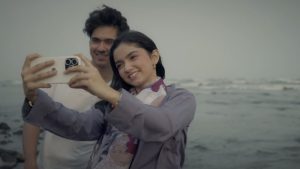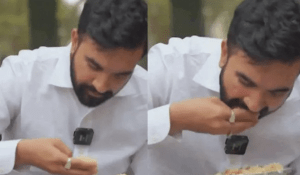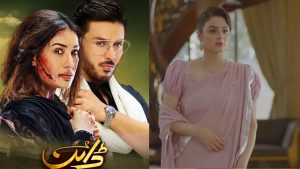Can you re-call the last time you saw a Pakistani drama where the main couple didn’t make you feel completely uncomfortable and determined never to marry in your life? The fact that we all have to sit down and really think for a while before answering such a question proves that no such positive dynamic between men and women in a television drama has yet provided this satisfaction.
This week, a drama “Ishq Hai” was trending on social media for the worst reason: glorifying a toxic relationship between a couple. In the clip, the main hero Shahzeb (played by Danish Taimoor) is seen threatening to kill himself to the woman Isra (played by Minal Khan) if she doesn’t marry him. He continues to count down from 10 with the gun pressed to his forehead, until we see Isra begging and promising Shahzeb that she will marry him.
The #ishqhai 101 on how to get a girl to agree to marry you pic.twitter.com/sBsOfRh1Qs
— AHI (@aamnaisani) July 8, 2021
For far too long, the narrative of Pakistani dramas has consistently depended on portraying this kind of toxic dynamic between men and women, where the latter is manipulated and pressurized into remaining with an abusive person which is considered to be the ideal fairy tale ending. Let’s recall back to some of the popular dramas and how they’re main couples fit into this dynamic. In Chupke Chupke, we saw Meenu getting kicked out of her house by her husband Faazi, and then almost divorced but then forgives him and comes back. In Meray Pass Tum Ho, the sole conflict of the show takes place because Humayun Saeed’s wife decides to become independent and find a job, therefore she has betrayed her “natural” role which was to be a housewife and a mom. Let’s face it: our drama’s cannot get themselves out of the stereotype that a good woman is submissive to her man, and doesn’t have an opinion or a personality of her own.
A perfect portrayal of fragile male ego coz of their in capability of understanding “No”.
There are 2 major methods to deal with a NO.
1. Call the women whore, slut, & whatever & make her life miserable.
2. Blackmail & manipulate her.
Both ways will help you turn a NO into a YES https://t.co/IfJIP5B22o— خراب عورت (@KharabAurat) July 10, 2021
We also need to talk about how our drama’s produce such content under the guise of “entertainment” and why it’s not acceptable to simply accept this justification. Actors and producers who have been questioned about the misogynist content in their shows have dismissed the claim by saying that they produce art for entertainment, and not for the sake of educating people. Is art created for the sole purpose for laughter? No it doesn’t and we need to debunk this notion because art also educates your audience on the kind of society they live within. When the people sitting in privileged positions of our society are producing media and art, they have the sole responsibility to create content that inspires people to reflect on their traditions and values, and also educates them rather than spreads disharmony, misogyny and harmful stereotypes!
Writer Bee Gul also pointed out that beyond cheap entertainment, art exists to empower its audience and eradicate harmful stereotypes rather than indulging in them. In her interview with Iffat Omar, she said that it is the sole responsibility of the writer that they produce socially conscious drama’s that educate their audiences:
“Our content creators have become terrified of producing shows that may challenge the patriarchal values they have been building their shows up on for so long. But I feel that we artists and writers need to understand that we do not produce art for the sake of cheap entertainment or for profit, but for the purpose of educating our audiences on social issues currently prevalent within our society.”









